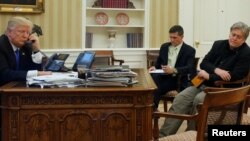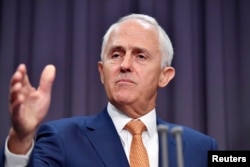“Do you believe it?” U.S. President Donald Trump tweeted late Wednesday.
“The Obama Administration agreed to take thousands of illegal immigrants from Australia. Why?” he raged, pledging to “study this dumb deal!”
What Canberra and Washington agreed late last year had nothing to do with illegal immigrants though. Instead, it was another domestically contentious issue in the U.S. The previous administration agreed to take an undisclosed number of asylum-seekers intercepted at sea while trying to get to Australia by boat.
In other words, the U.S. would take in refugees from a longtime ally to help the ally out.
By some media accounts, the deal sparked a testy phone exchange Saturday between Trump and Australian Prime Minister Malcolm Turnbull — a day after Trump suspended the U.S. refugee resettlement program.
'Heart of the nation'
Depending on who you talk to, accepting refugees might be considered a burden or a responsibility. It is always a negotiation, domestically and internationally: which countries will take in refugees permanently, and when, and from where.
When the U.S. takes in refugees, it telegraphs not only that the country is welcoming to those fleeing persecution, or upholding certain values, but also that the U.S. is showing solidarity with allies far more taxed by displaced people.
“The difference between 50 [thousand] and 100,000 in terms of ... impacting the pressure of refugees flows is negligible,” says James Jay Carafano, vice president for foreign and defense policy studies at the Heritage Foundation, who supports the Trump administration's decision to halt refugee arrivals temporarily and cut the ceiling by more than half this year. Accepting refugees is an administration's way of showing “solidarity, not to strategically impact refugee flows.”
“People have refugee policies because it says something about the heart of the nation,” says Carafano.
In the big picture of refugee resettlement, the U.S. has been a leader — yet it was never enough. The supply — the number of spaces allocated to the displaced Syrians, Burmese and Congolese who could not return home — was never enough to meet the demand.
UNHCR estimates there are more than 16 million refugees under its mandate.
Even at the most recent peak of American refugee resettlement in 2016, the U.S. took 0.4 percent of the total refugee population.
Yet, that's more than half of the population the U.N. recommended for resettlement — about 85,000 of roughly 150,000 refugees who were placed permanently in so-called “third countries.”
Citing “national security” interests, Trump stopped arrivals a week after his inauguration. The move rankled refugees and their supporters.
Eskinder Negash, former head of the Office of Refugee Resettlement, says that decision is a failure of the “guiding principles” for refugee resettlement.
“What we're seeing now is the whole program is framed from a national security perspective. From my view, that doesn't take into account foreign policy or humanitarian concerns,” says Negash, himself a refugee from Eritrea who served at ORR under the Obama administration and is now with the U.S. Committee for Refugees and Immigrants.
“When you take the whole executive order — in its totality, it doesn't seem to be a national security concern. It seems to be some kind of political decision,” says Negash.
Australia resettles refugees through the U.N. system, but does not accept asylum claims of those arriving by sea. Those individuals are instead transferred to detention facilities on Manus Island and Nauru. So when the U.S. agreed to take in 1,250 refugees, it was a gesture of support to a longtime ally. White House spokesman Sean Spicer said Thursday that Trump does not like the deal, “but out of respect for [Turnbull], he's going to allow that process, continue to study it.”
More than being nice
Beth Ferris, research professor at Georgetown University's Institute for the Study of International Migration, believes the leadership role in resettlement has a wider impact. Pulling back on the program sets the tone for the countries sharing the largest numbers of refugees — like Jordan, Turkey and Lebanon — who may see it as a signal that they can also scale back on their support to refugees.
Unlike Carafano, she sees Trump's order as a blow to an imperfect but much-needed international system.
“When the U.S. does something like that, the Lebanese are going to question, ‘Why are we stuck holding the bag?’” says Ferris.
In a response from the Migration Policy Institute to the refugee program cuts, Kathleen Newland and T. Alexander Aleinikoff wrote that “The United States' willingness to share the responsibility of providing solutions for refugees sends an important signal to allies and adversaries alike that U.S. policy stands firmly against persecution.”
“Critics of our humanitarian immigration policies will tell you that asylum is a gift, given to needy people because Americans are nice,” asylum lawyer Jason Dzubow said at an event organized for refugees in January, days ahead of the Inauguration. “And it's true that giving refuge to people fleeing persecution is the right thing to do ... But America did not create the asylum system to be nice.”
“Granting asylum to those who have stood with us, and who have risked their lives to advance the values that we cherish, sends a powerful message: When you work with us, when you work for the values we believe in, America has got your back," Dzubow told the crowd at the Refugee Ball.
“You can't refugee [resettle] your way out of this problem,” argues Carafano, who advocates instead for expanding solutions in the countries where those fleeing persecution and violence first arrive. “The solution to refugees in the Middle East is not accepting refugees.”
The decision to dramatically scale back the refugee program prompts questions from those who support and oppose the order, though: will U.S. aid to countries like Jordan and Lebanon grappling with high numbers of refugees be increased to compensate?
“I would suspect that Jordan needs the influx of U.S. funds; they'll be reluctant to jeopardize that over this,” says Ferris, adding the caveat: “We talk about supporting host countries and host communities, but we're really not very good at it.”





